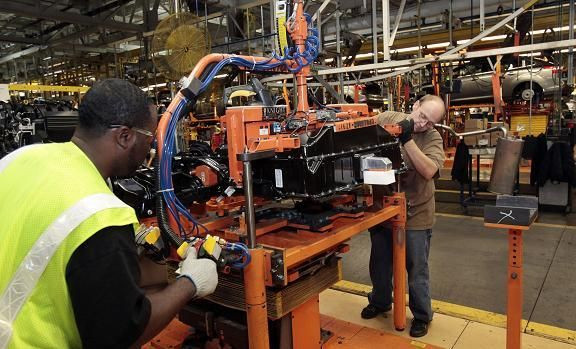US, UK, Asian Manufacturing Revives In December, While Euro Zone Factories Struggle

While manufacturing in Asia and the U.S. closed out 2012 on the upswing, factory activity in the crisis-plagued euro zone shrank further in December, adding to evidence that the euro area economy may have slipped further into recession in the fourth quarter and will continue to struggle in early 2013 at least.
Manufacturers helped lift the 17-nation bloc out of the last recession, but new surveys released Wednesday showed the region’s manufacturing sector entered 2013 in a mostly downbeat fashion.
Markit's euro zone Manufacturing Purchasing Managers' Index (PMI) fell in December to 46.1 from 46.2 in the previous month, a steeper decline than the initial estimate of 46.3 published on Dec. 14. A reading below 50 indicates a contraction. The index has been below the 50 mark since August 2011.
The breakdown by country points to industrial weakness in virtually all of the major euro zone economies. While the southern and peripheral countries are not surprisingly seeing the weakest performance, even the German industrial sector -- supposedly the hyper-competitive engine of euro zone growth -- remains deep in recession territory.
Ireland was the only member of the currency union to register growth in December. However, even Ireland’s new orders index has slipped back over recent months, suggesting that the slowdown in global economic growth is starting to have an impact.
"The euro zone manufacturing sector remained entrenched in a steep downturn at the end of the year. The region's recession therefore looks likely to have deepened, possibly quite significantly, in the final quarter," said Chris Williamson, chief economist at Markit, in a statement.
December’s manufacturing PMI supports other evidence suggesting that “the euro zone economy fell further into recession in the fourth quarter of last year and offers little hope that the industrial sector will support growth in the early part of 2013 either,” Jonathan Loynes, chief European economist at Capital Economics, said in a note. “Against that background, the threat of a re-escalation of the region’s debt crisis remains ever present.”
The one exception to the continent’s gloomy picture was the U.K., where factory output in December unexpectedly expanded at the fastest pace in 15 months. Wednesday’s figures boost prospects that the British economy can avoid slipping into its third period of contraction since the 2008 financial crisis.
US: Modest Growth
The U.S. manufacturing sector expanded slightly last month, while employment picked up.
The ISM's manufacturing purchasing manager’s index increased to 50.7 in December, which was a bit stronger than the consensus estimate of 50.5 and above the November reading of 49.5. There was a notable increase in the employment index, which rose to 52.7 from 48.4 in November.
Smoothing through some of the volatility seen in recent months, the December reading stands basically in line with the six-month average reading of 50.5.
The very modest rebound in the ISM manufacturing index “illustrates that the factory sector ended last year still caught between the crossfire of a global economic slowdown and the looming fiscal cliff, which prompted some businesses to postpone investment,” Paul Ashworth, an economist at Capital Economics, said in a note.
“The deal reached yesterday to avert most of the scheduled tax increases could provide a small boost to manufacturers in January, but it is far from a certainty, particularly since the spending cuts that will hit government contractors hard have only been delayed for a couple of months,” Ashworth said.
Earlier Wednesday, data provider Markit said its own U.S. factory index increased to 54.0 in December. That was up from 52.8 in November and the highest reading since May.
“While economic growth may disappoint in the fourth quarter compared to the 3.1 percent rate of expansion seen in the third quarter, the recent run of positive PMI surveys toward the end of 2012 suggests that prospects have begun to look a little brighter for the new year,” said Markit Chief Economist Chris Williamson in a statement.
Asia: Signs Of Strength
Manufacturing in Asia is gaining steam after a subdued 2012, but conditions overall remain weak.
Six countries in the region outside China released their December PMIs over the past couple of days. The headline numbers improved in India, Korea and Taiwan, but worsened in Indonesia and Vietnam. The PMI for Australia was unchanged.
India’s PMI continues to be the highest in Asia. After falling sharply in the middle of 2012, the headline number has now increased for three consecutive months. However, at 54.7 in December, it is still well below its average of the past few years.
According to Capital Economics Asia Economist Gareth Leather, both the input and output price component of the PMIs in India remain elevated, which will make it difficult for the central bank to justify aggressive rate cuts over the next year.
Australia’s PMI was the lowest of all six economies. The weakness is in large part due to the strength of the Australian dollar, which has caused the competitiveness of the country’s manufacturing sector to suffer. “With the manufacturing sector remaining weak and the mining sector starting to cool, further interest rate cuts are likely in Australia this year,” Leather said.
Both Korea and Taiwan’s headline PMIs improved, and they were above the 50 level for the first time since May. Nevertheless, in both countries the PMIs were still well below their long-run average levels.
Manufacturing activity in China expanded at a mild pace in December. The official manufacturing PMI for the month was unchanged from November's 50.6, the China Federation of Logistics and Purchasing, which issues the data along with the National Bureau of Statistics, said in a statement on Tuesday.
“The latest PMIs show that despite some signs of improvement, the region’s manufacturing sectors are still doing poorly,” Leather said. “An improvement in global sentiment should give a boost to manufacturing sectors in most countries in the coming months but a strong rebound is unlikely.”
© Copyright IBTimes 2024. All rights reserved.






















